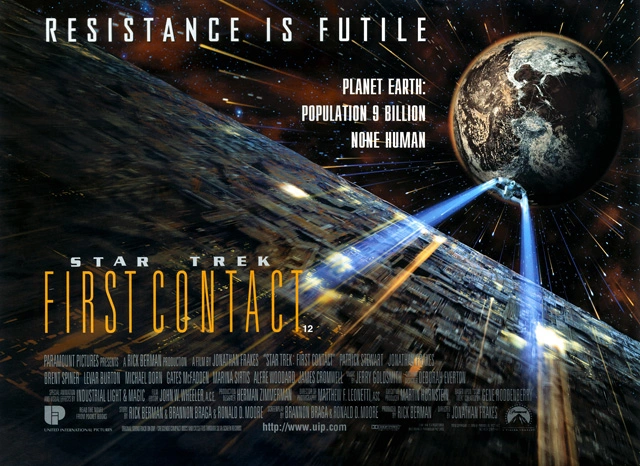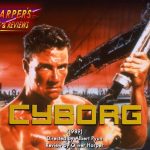Star Trek: First Contact (1996)

“Star Trek: First Contact,” released in 1996, is a seminal entry in the Star Trek film franchise, directed by Jonathan Frakes in his feature film debut. As the eighth installment in the series and the second film featuring the cast of “Star Trek: The Next Generation,” it masterfully blends science fiction, action, and philosophical themes, providing a thrilling exploration of humanity’s future and its relationship with technology.
The film’s premise centers around the Borg, a menacing collective of cybernetic beings who seek to assimilate all life forms into their hive mind. When the Borg attempt to prevent humanity from achieving its first warp drive flight—a pivotal moment in human history—the crew of the USS Enterprise-E, led by Captain Jean-Luc Picard (played by Patrick Stewart), must travel back in time to the pivotal year of 2063. Their mission is to ensure that the first contact between humans and Vulcans takes place as planned, thereby securing humanity’s place in the interstellar community.
One of the most striking elements of “First Contact” is its deep exploration of themes such as the nature of humanity, the fear of technological advancement, and the ethical implications of individual versus collective identity. The Borg serve as a stark representation of these themes, embodying the loss of individuality and the dangers of unchecked technological evolution. Captain Picard’s personal struggle with his own experience of assimilation at the hands of the Borg adds emotional depth to the narrative. His determination to protect humanity, despite his own trauma, illustrates the resilience of the human spirit in the face of overwhelming odds.
The film’s pacing is expertly crafted, seamlessly alternating between the action-packed sequences in the present and the character-driven moments in the past. As the crew navigates the complexities of time travel, they encounter key figures in human history, including Zefram Cochrane, portrayed by James Cromwell. Cochrane’s transformation from a disillusioned inventor to a visionary leader who initiates humanity’s first steps into the stars is a central focus of the film. His character represents the potential for growth and change, emphasizing the importance of hope and ambition in shaping the future.

Visually, “First Contact” is a standout film in the Star Trek franchise. The special effects, especially in depicting the Borg and their ships, are both striking and innovative for their time. The cinematography effectively captures the contrast between the sleek, advanced design of the Enterprise and the gritty, industrial aesthetic of the Borg vessels. These visuals enhance the film’s tension and excitement, making the stakes feel real and immediate.

The performances of the cast are another highlight of the film. Patrick Stewart delivers a powerful portrayal of Captain Picard, infusing the character with a sense of gravitas and emotional weight. His interactions with the rest of the crew, including Commander William Riker (Frakes), Lieutenant Commander Data (Brent Spiner), and Lieutenant Worf (Michael Dorn), showcase the camaraderie and unity that define the spirit of Starfleet. The ensemble cast brings a depth and authenticity to their roles, making their struggles and triumphs resonate with audiences.
The score, composed by Jerry Goldsmith, is a crucial element that enhances the film’s emotional impact. Goldsmith’s sweeping orchestral themes capture the grandeur of space exploration and the intimate moments of personal growth, elevating the film’s narrative arc. The music beautifully complements the visual storytelling, drawing viewers further into the journey of the characters.

Despite its many strengths, “First Contact” does face some criticisms, particularly regarding its pacing in certain sections. Some viewers may find the transition between action and exposition occasionally jarring. Additionally, while the film is praised for its philosophical themes, some may argue that it could delve deeper into the implications of its commentary on technology and humanity.

In conclusion, “Star Trek: First Contact” is a remarkable film that embodies the essence of the Star Trek franchise. With its engaging narrative, rich thematic exploration, and strong performances, it captivates audiences while inviting them to ponder the future of humanity. Jonathan Frakes’ directorial vision, combined with a talented ensemble cast, ensures that “First Contact” remains a beloved and significant installment in the Star Trek saga.











